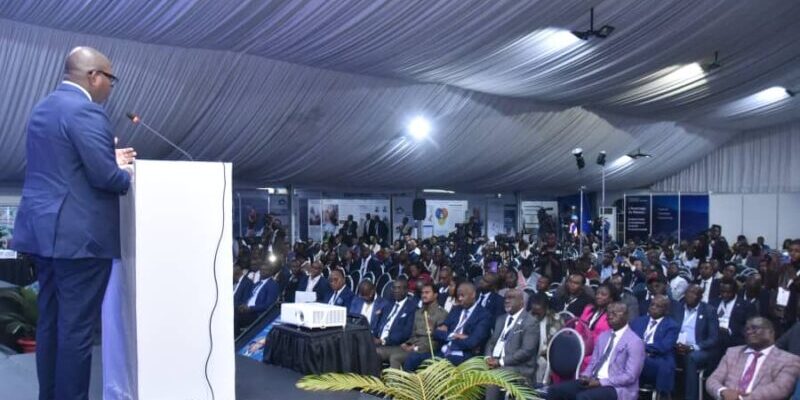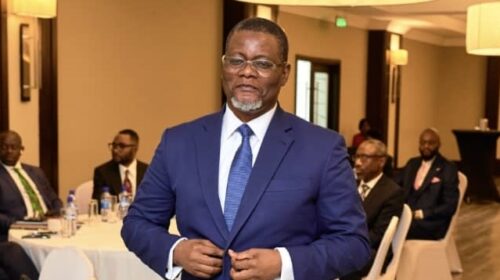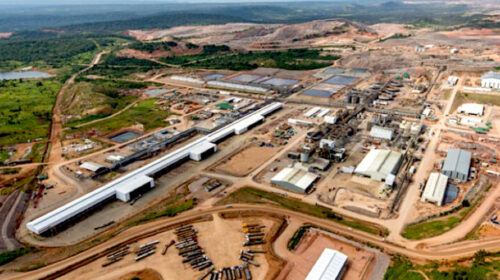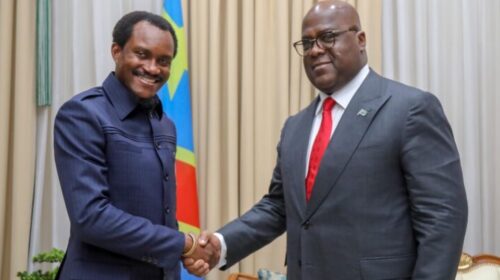DRC Mining Week 2023: Lukonde Addresses Sector Challenges with Mining Operators
Representing the President of the Republic, Félix Tshisekedi, the Prime Minister, Jean-Michel Sama Lukonde, spoke on Thursday, June 15, 2023, at the mining week in the Democratic Republic of Congo called “DRC Mining week”, which opened in Lubumbashi on June 14 under the theme: “Recognizing the trophies and victories of the mining industry in the DRC and outside”. For the occasion, the Head of Government answered a series of questions.
I will give answers, perhaps from the institutional point of view. Because I followed the debate earlier. From the institutional point of view, it is first of all the shock resulting from this Russian-Ukrainian war. And all of us realize, from that moment on, that the bulk of our imports, especially cereals, came from Ukraine.
And all the other countries were affected. And so each country turned to its local production. And we too, as a Government, to question ourselves on the subject, on the question of telling ourselves, we must absolutely guarantee our food security. And, beyond this food security, guarantee our own local production. For that, we have first of all, and that’s good, because we are with the Minister of Industry,
And to go further with his call to see the other economic sectors of the country, like agriculture, also have forums of the scale of DRC Mining Week. He also insisted on the role of the Government to put in place the framework to allow the emergence of agricultural production.
First of all to have, precisely, at the level of education and health, basic infrastructures. Basic infrastructures also at the level of our administrations for the return of the authority of the State. But afterwards, it is to have agricultural feeder roads. Because that’s where, we’ve talked about, a big part of the solution.
The role of the State is to provide the framework that will allow the emergence of agricultural production. And so, the agricultural feeder roads, it is our responsibility to put them in place so that all the production, which is done in the interior, can reach the major centres. And moreover, at the same time, solving another important problem, that of the rural exodus, the displacement of populations, because not having the possibility of having income in their local living environments, the interior of the territories.
Then, alongside these agricultural feeder roads, an energy plan, which is in deficit today in the mining sector. If we ever want more production, we’re going to have to have more energy. Of course, the public-private partnership that we have, particularly with the mining companies, provides the solution.
Earlier, with those in charge, I encouraged them to do more. And it is up to us, at the level of the Ministry of Water Resources, to also improve the conditions in terms of investments in the energy sector. Because in reality, energy goes hand in hand with all production. And agricultural production too. And so, today we are talking about the Grand Inga.
Referring to the correlation between the mining sector and the agricultural sector, Prime Minister Sama Lukonde referred to the evaluation of the 2018 Mining Code, five years later, to say that mining sector taxes can, without being increased, compared as it stands, help boost the agricultural sector through good guidance or assignment.
“Today, I believe that it is necessary, within the framework of the evaluation that must be done, you know that we have a Mining Code, which will total its 5 years this year since 2018. And therefore which requires a And as part of this review, there were already improvements that had been given, from 0.3% to the base entities, which could also be used for farming.
But also see what could be done without weighing down the taxes that we already have in the mining sector. And maybe in terms of the direction of those taxes,” he said.
The Head of Government also recalled the reflection on the need for local processing with a view to adding value, on the means to be used to propel the agricultural sector, and the protection of the local market against external competition.
Today we already have special economic zones within the framework of industry. But we want more industrialization in the country.
It is important that we can direct the resources, which we are going to have on this added value, towards the industry sector and have more processing alongside mining production.
I also want to mention that besides all these factors, we also have to protect our market. Today, we are talking about agricultural production. But if we put the framework that I talked about, we want more incentive in the agricultural sector. But we have to deal with external competition.
It is important to protect our own production so as to have more incentives for more investment. The resources to be put into the agricultural sector, because the governor of central Kongo spoke about it, it is much more to accompany.
But it is the framework that we are setting up, that is to say these roads and this energy that we have talked about, which will allow investors to come to this sector.
They are the real producers in the agricultural sector. And so, I believe that all of these challenges are there in front of us. Today, we are working with all these programs that I have spoken about to put in place all this necessary framework”, concluded the Prime Minister.
They are the real producers in the agricultural sector. And so, I believe that all of these challenges are there in front of us. Today, we are working with all these programs that I have spoken about to put in place all this necessary framework”, concluded the Prime Minister.
They are the real producers in the agricultural sector. And so, I believe that all of these challenges are there in front of us. Today, we are working with all these programs that I have spoken about to put in place all this necessary framework”, concluded the Prime Minister.
It is important to emphasize that long before the Prime Minister, during a panel, three Provincial Governors, namely that of Haut-Katanga, Kongo Central, and Tanganyika, had each given the strategies of his entity in relation to to the issue of industrialization and agriculture to ensure food security.
It should also be noted that before entering the room, Prime Minister Jean-Michel Sama Lukonde first met with Congolese employers, including the bosses of large mining, banking, and other companies, to discuss issues related to collaboration between investors and the government, particularly regarding the business climate. Afterwards, he visited the different stands erected by the various companies exhibiting at this forum.
Additionally, several mining operators and general managers of large companies in the country took part in this conference, which addressed various themes.
Furthermore, the current allocation of funds from the mining sector to boost the agricultural sector represents a significant return on investment, considering its past contribution to the construction of the Union Minière du Haut Katanga (UMHK), the predecessor of Gécamines.
![]()





